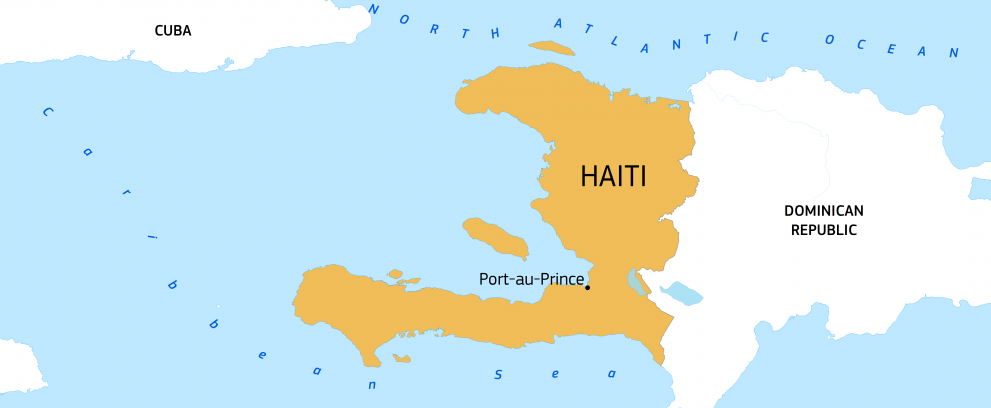Introduction
Haiti is a chronically fragile state, highly vulnerable to natural hazards and human-induced disasters. The country is presently facing a surge in gang violence amidst deep socio-political instability.
Gang-related violence has reached unprecedented levels: almost 80% of the capital Port-Au-Prince is under control of armed groups, affecting the lives of 1.5 million people.
What are the needs?
Haiti has been grappling with a food crisis for the past 5 years. The ongoing clashes between rival gangs in the metropolitan area of Port-au-Prince and in other departments of the country have created a hostage-like situation for people, making it difficult for them to access basic services such as food, drinking water and health.
Some 5 million people (nearly 50% of the population) are currently facing acute food insecurity, 1.65 million of which are living in immediate need of help. About 276,000 children aged 6-59 months, pregnant and nursing women are at risk of acute malnutrition, including over 125,000 severe cases.
Over 362,000 people had to flee their homes to survive, becoming internally displaced. The number of people in need of protection has increased to around 1.2 million in the 2024 Humanitarian Response Plan. More and more people are fleeing the capital to reach provincial towns that lack resources and infrastructure to welcome displaced populations.
The extreme levels of violence have also made it challenging for children to access education. Many schools have closed and many of them are increasingly used as shelters for internally displaced people. At the same time recruitment of children into armed gangs is an ongoing threat to children’s safety and wellbeing. As of January 2024, an estimated 30-50% of gang members were minors.
In addition, cholera has made its way back into the country, in a context where the health system is severely affected by the worsening crisis and security/logistical constraints. At least 50% of Port-au-Prince’s health facilities are closed or functioning below their normal capacities, while only a single public hospital in Haiti’s capital now remains operational. The main port and airport in Port-au-Prince have been non-functional since March 2024, with serious repercussion on the supply of critical necessities such as drugs.
The complex situation has forced many Haitians to leave their country. According to migration authorities in Panama, in 2023, more than 46,000 Haitians crossed the dangerous jungle between Panama and Colombia (known as the Darien gap).

How are we helping?
With €510 million allocated since 1994, Haiti is the main recipient of EU humanitarian aid in Latin America and the Caribbean.
The EU has provided humanitarian aid to victims of major crises in Haiti, including the ongoing violence, the effects of the 2021 earthquake, the COVID-19 pandemic, and food shortages and malnutrition in recent years.
Following the floods that afflicted the country in June 2023, the EU responded by supporting the Haitian Red Cross and the International Organization for Migration to meet immediate needs through the provision of hygiene kits, cooking facilities, drinking water, and the repair of sanitation to reduce the risk of cholera spreading.
In 2024, the EU has allocated €20 million to address the needs of the most vulnerable population. Among the different areas of intervention, the funding aims to:
- address the survival needs of people affected by the recent increase in political and gang-related violence, including forcibly displaced people,
- strengthen the capacity of communities to respond to disasters,
- help provide children with access to quality education in a safe environment,
- support the emergency response to the cholera epidemic currently affecting Haiti,
- improve coordination and security management for the humanitarian community.
In April 2024, the EU activated an EU Humanitarian Air Bridge consisting of five humanitarian flights that shipped 62 tonnes of relief items from Panama to Cap-Haïtien.
Since 1998, the EU has invested around €38 million in its disaster preparedness programme, aiming to put in place early warning systems and rapid response capacities.
This funding aims to strengthen the emergency response through strategic partners working closely with national response bodies against recurring natural hazards. Improving the resilience of the most vulnerable communities to natural and epidemic risks remains a priority.
A Memorandum of Understanding on disaster risk management has been established as a new collaboration instrument between the European Union and the Latin America and Caribbean region. This agreement focuses on disaster preparedness and risk management, and it became effective in May 2024. Regional disaster management agencies, including the Caribbean Disaster Emergency Management Agency (CDEMA), have signed as parties to the agreement.
Last updated: 15/05/2024
Facts & figures
5.5 million people in need of humanitarian aid
5 million people are estimated to be acute food insecure
276,000 children aged 6-59 months, pregnant and nursing women are at risk of acute malnutrition
4.7 million people in need of basic health
3,4 million people in need of basic water, sanitation and hygiene services
EU humanitarian funding:
€20 million in 2024
€510 million since 1994

